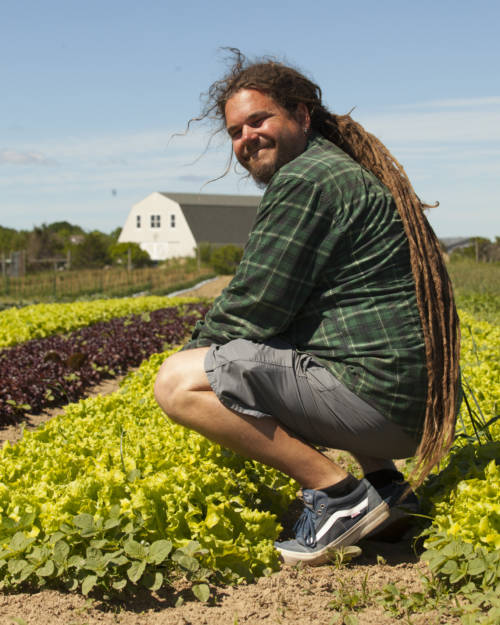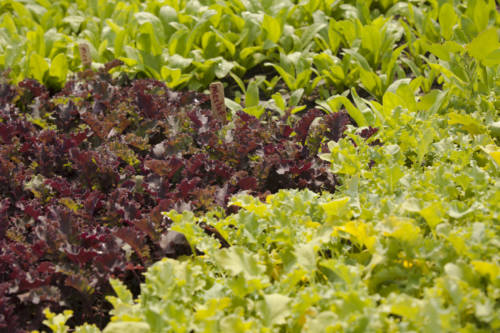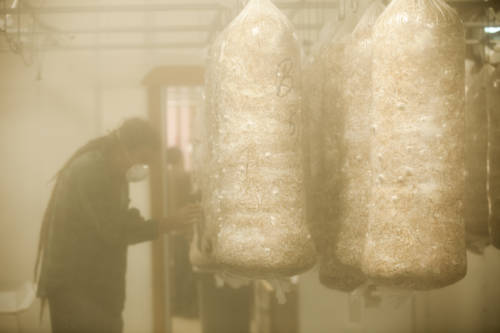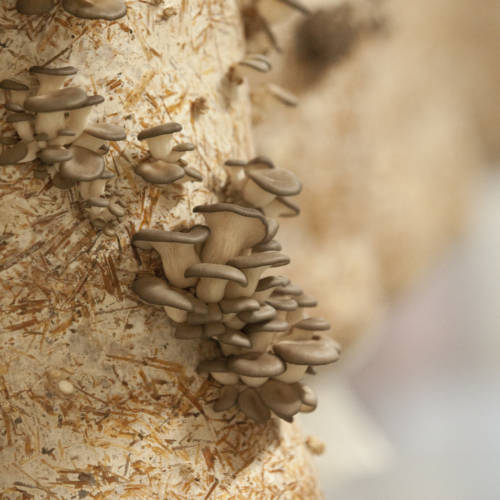
Open Minded Organics Explains Their New Farming Philosophy
In Search of a Greener New York is an ongoing Garden Collage series of explorations about sustainability efforts in New York City and beyond– including the people, places, and ideas that are making Manhattan a healthier, happier place to live. In this column, we spotlight individuals who are making New York a “greener” place in an attempt to discover how, exactly, they are doing it. This week, GC spotlights David Falkowski of Open Minded Organics, who’s earned a reputation for his unparalleled mushrooms.
At GC, we often tell the stories of different family farmers throughout New York City, taking a peek into their lives and what centers their worlds. Recently, we met up with David Falkowski, the owner of Open Minded Organics in Sag Harbor, New York, whose mushrooms are some of the best we’ve ever had.
Falkowski is a bit of a celebrity in his sphere (in addition to being known locally as The Mushroom Man, he appeared on an episode of Ina Garten’s Barefoot Contessa)– though he still works a separate day job. That sort of dichotomy epitomizes the balancing act Falkowski manages as a “famous” family farmer. The name of the farm– Open Minded Organics– is well-chosen, reflecting both Falkowski’s circuitous path to farming and his approach to maintaining his business. Falkowski has enjoyed considerable success over the years by keeping himself well-informed and willing to go against the grain (most notably in his decision to not pursue an organic certification– but more on that later).
Despite the fact that farming has been in Falkowski’s family for almost a hundred years, it took a bit of soul searching before he came around to the idea of agriculture. “Most of my memories of farming when I was younger were not the most pleasant,” Falkowski recalls. “I’d be in the backyard playing catch with my Dad and on one end we had an orchard and on the other end we had a vegetable garden. Inevitably, after ten minutes, the ball either ended up in the orchard (and I would wind up suckering trees)– or the ball would land in the garden, and I’d wind up picking rocks out of the beds.”
During his early 20s, Falkowski was traveling in Costa Rica and happened to take a permaculture class, which piqued his interest in systems design. That class turned him on to a seminar with noted mycologist Paul Stamets, which drew him further into the world of agriculture.
“The idea was actually, originally, that I was going to be growing specialty nursery stock and offering edible landscaping,” Falkowski explains. “Unfortunately, I was a little bit ahead of my time.” He laughs, “Now it’s a big thing. Fifteen years ago, I was one of a handful in the whole region here. The time wasn’t really right for that type of business.”
In the early 2000s, he began growing mushrooms on the side as hobby, but in the fifteen years since, it’s become his signature product. Falkowski credits his success with the simultaneous cultural rise of farmers markets, which allow him to get his delicate, specialty crop directly to the consumer, ensuring they are as fresh as possible.
Today, in addition to his famous fungi, Falkowski offers an impressive array of vegetables and herbs at his farmers market stand. From its humble beginnings (“I think I got five bunches of dahlias and ten bunches of parsley,” he says, recalling his first harvest), his garden has become an integral part of Open Minded Organics, which has almost 300 varieties of vegetables and herbs grown and sold.
As one might expect, small-scale farming in the 21st century is hardly a bucolic experience– there are plenty of challenges to contend with. More so than the seasons, Open Minded Organics is regulated by the ebb and flow of the Hamptons– itself a force of nature. “This is a very unique area,” Falkowski explains. “We’re a resort area, so our season is a pyramid. For that, we’re a three-season farm.” During July and August, Falkowski and team are “operating at near crisis levels in order for us to earn a year-round living. For most of my mushrooms, it’s a 24-hour turnaround from the time we’re picking them to their being served somewhere.”
To complicate matters, Falkowski has to navigate controversy over organic certifications.
“My operation is what we call a ‘split operation’,” Falkowski begins, breaking down the familiar “organic” label, whose criteria and politics often evade attention. “My mushrooms are certified organic. The vegetable operation is currently not certified– and never was. I’m withholding at the moment from continuing through that process. There’s lots of good reasons for it.”
Falkowski isn’t alone in his beliefs; more and more small farmers are turning away (or being ousted) from the organic farming certification.
“I try to explain to people– especially at the farmers market– that organic farmers are allowed to use pesticides, herbicides, fungicides, and even antibiotics.”
“Certified organic is simple to file. There’s a document published every year, put out by the USDA, that lists practices and products and amendments approved for organic production. It’s a lofty read,” he adds lightheartedly, before returning to the serious matter at hand. “It does not mandate the use of many things. For instance, a certified organic farmer is not mandated to use compost. They’re not mandated to use biologicals to control disease or pests. They would be limited to certain products to use to control pests and disease. But I try to explain to people– especially at the farmers market– that organic farmers are allowed to use pesticides, herbicides, fungicides, and even antibiotics.”
Falkowski points to one pesticide in particular that epitomizes the trouble with organic labels and the products certified organic farmers are allowed to use under the USDA’s guidelines. PyGanic, which comes from the chrysanthemum flower, is a non-target specific insecticide– meaning when it’s sprayed, everything at the point of contact dies, beneficial and predatory creatures alike. PyGanic completely evaporates off, leaving no residue, but it is still an identified neurotoxin.
Falkowski is frequently asked by farmers market shoppers about the missing organic certification, especially as more and more big name stores offer organic options. In those instances, he always assures his customers, “It’s the same food I put past my two-year-old’s lips.”
In spite of the challenges, Open Minded Organics has followed a fruitful “natural progression” over the almost fifteen years they’ve been in business. Their latest venture was a farm kitchen, where they now produce goods like spinach walnut pesto or shiitake pâté to sell at their farmers market stand. The farm kitchen allows them to simultaneously turn an extra profit while using up food that would otherwise go to waste– making their farm more sustainable (environmentally and economically) in the long run.
Reflecting on the philosophy he guides his business with, Falkowski notes, “I do the best I can to look at things from as many angles as possible. It’s a big ship to steer. But just looking at the structure of the farm and business, where it’s come from and gone to, you can see that we’ve had open eyes and ears, and have been looking and listening. That’s led us to where we are.”





































